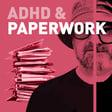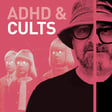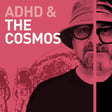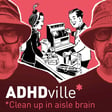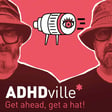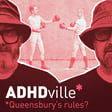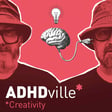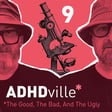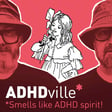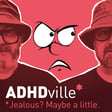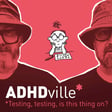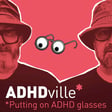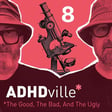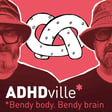Become a Creator today!Start creating today - Share your story with the world!
Start for free
00:00:00
00:00:01

Episode 76 - 10 Famous People Who May Have ADHD
Join Martin West and Paul Thompson in ADHDville, the podcast where ADHD meets entertainment! In this episode, Martin and Paul dive into the fascinating world of famous historical figures who may have exhibited ADHD traits. From hyper-focused scientists to impulsive artists, they explore how ADHD-like characteristics have shaped the lives and legacies of some of history's most iconic personalities.
Transcript
Welcome to ADHDville
00:00:00
Speaker
one And we're back in the room. back Back in the room. Back in the room. And this episode is for anyone who is wondering if ADHD was just oozing out of some people as well.
00:00:15
Speaker
Not just you. Some famous people, yeah. Some famous people. Are there any famous hidden people that we've not talked about? So...
00:00:26
Speaker
Let's go and... I'll start again. Let's go to the place where the distractions are landmarks and the detours are the main roads. Welcome to ADHDville.
00:00:42
Speaker
landmarks, detours are the main roads. Yes, they are. Oh, oh, oh.
00:00:56
Speaker
Famous people Famous people Distractions, landmarks, detours, main roads, etc. Hello, welcome to ADHDville.
Hosts' ADHD Journeys
00:01:08
Speaker
I'm Paul Thompson, and I was diagnosed with the ADHD just over some yonks ago. And I'm Martin West, and I was diagnosed with the combined poo-poo platter in 2013.
00:01:22
Speaker
Well, what's on the poo-poo platter? Is it like a cheese platter? It is. It is. it it it is a a platter of poo-poo. Poo ADHD.
00:01:34
Speaker
Pooiness. Yeah. Okay. So we're just two mates, not two, not four, not 17, two mates who by coincidence or not, after 39 years of friendship, friendship.
00:01:48
Speaker
Discover it's almost almost 40 years actually discover that we're co ADHD is who'd have thought it now it's really important to say this is an entertainment podcast about ADHD and does not substitute for individualized advice from qualified health professionals so don't take any advice from him or him.
The Inclusive World of ADHDville
00:02:09
Speaker
We're just here with some kind of all-inclusive ADHD part-based with room for everyone, including your doppelgangers, your alter egos, your buddy doubles, your chaperones, and even your best buddies. Still here? Congratulations.
00:02:22
Speaker
Then grab your jetpacks, your pedalos, your space hoppers, your kayaks. and any other transportation methods that let us take you to ADHDville, an imaginary town we've created in our minds, where we like to explore different parts of the A, the D, the H, and the D again.
00:02:43
Speaker
ah We start off as we are now in the king's agitated head, um in the centre of ADHDville, where we, the ex-mayors of ADHDville, take care of business.
00:02:58
Speaker
um And this week ah we we we've we've just done two um interview guest episodes. so So this one, this one's more fun.
00:03:09
Speaker
We thought we would do a ah sort of a ah lighthearted little little bit of fun. um A detour.
ADHD Traits in Famous Figures
00:03:18
Speaker
Yeah. Yeah. um So I think what we're going to do is we're going to learn about some famous people.
00:03:25
Speaker
Famous people, Paul. Yes. Don't you know, don't you know. Others ever. We've not compared notes. No, we haven't. Ah, no, we haven't. So we haven't. No, we haven't. No, no.
00:03:36
Speaker
We haven't compared notes. So I'm interested. was thinking, I was preparing for this, Martin. I was thinking, oh, wonder if Martin's got the same peeps. What if? Because we've got 10 total, five each. Okay.
00:03:49
Speaker
Five from each of the co-mares. Okay. What What if? X-Men's what if our five because we don't know yet they're the same as each other's yeah well I have something I have some backup uh famous people who potentially have ADHD just in case I've got no backups you know what I'm saying lad I got some backup all right e to me to me to you let's Let's jump into our backup mode of transportation, yeah the tractor.
00:04:24
Speaker
And where should we go, Paul? Tell us where we are going. Let's go to the library, Martin, just saying, you know, spontaneously. Learn things. Learn things. we go to learn Read up on some, you know, old people.
00:04:39
Speaker
Right. Pop in.
00:04:47
Speaker
um
00:04:58
Speaker
It's the library, so we're going to have to be quiet. You know what mean? place I don't want to get on with that.
00:05:06
Speaker
It reminds me that joke, Martin. What's that? A man goes into this place he says, can I have two and two chips, please? And the lady goes up to him and says, excuse me, sir, this is a library. He said, oh, sorry, two cod and two chips, please.
00:05:26
Speaker
I'm just wondering whether you said that joke the last time we were in the library. If he did, oh let us know in the comments. Oh, God. so okay so let' us So what we've done, right, we have come up with 10 people who are not the classic. Well, classic people why not who have ADHD.
00:05:47
Speaker
They're trying to be a little bit different from the kind of the normals, if you like. Yes. um Yeah. I mean, they're not – everyone talks about – there's some usual suspects. Everyone talks about – who do they talk about?
00:06:03
Speaker
Leonardo da Vinci comes up a lot. Yeah, yeah, yeah. I I've got one of mine is is kind of, you might have heard in terms of, you know, being um associated with ADHD, but the others not, I suspect.
00:06:22
Speaker
how did you how How did you do your research? Randomly. I did mine. What? I went all over the place. I tried to like mix it up with contemporary and antique and historical, not so antique historical figures, you know, mixed it up. Like I haven't got none of mine are are still alive.
00:06:48
Speaker
Neither are mine. They're all deed. They're all very much deed. Okay. They're all pushing up daisies. Very much so. So just just to let you know how ah how I did my research was I got onto AI and said, right, look at all the characteristics of ADHD, right?
00:07:13
Speaker
Then... yeah Create a list of all the famous people, and then I want you to cross-reference and see if you can find some people who display ADHD characteristics but are not traditionally known as having ADHD. Yes.
00:07:36
Speaker
Okay. So I use the power of the AIs to create my list. Okay. well do what Do we want to put out the list up the front or do you want to discover them as and when?
00:07:52
Speaker
We will dis this dis discover them as we go. you want to start then? I will start. Take the plunge. Yeah. I will start with my opening salvo
Spotlight on Historical Figures
00:08:07
Speaker
is. Cross the bowels.
00:08:09
Speaker
Right. It's this scientist, this French physicist and mathematician who founded the field of electromagnetism, André-Marie Ampère, 1775 to 1836. Hence amps.
00:08:25
Speaker
So that's where you get the amps from. that's where you get the amps from So he discovered um I don't know whether he was like looking under a log or he dug a hole, but we great but he he found some amps and went, that's amps, that is.
00:08:43
Speaker
so he's So he's ADHD-like traits, if you like. So Ampere was known for his hyper-focus on scientific problems, often forgetting to eat or sleep.
00:08:58
Speaker
um He was also highly imp impulsive, jumping from one idea to to another and struggled yes with organization in his personal life. His notebooks were famously chaotic, Paul, filled with scattered ideas and calculations.
00:09:14
Speaker
So. So not officially diagnosed with ADHD, but kind of no had some of those characteristics, Paul. Yeah. You know what I'm saying? It sounds suspicious. sounds suspicious.
00:09:27
Speaker
Like my little nose is going. So here's my – so – yeah so he's quiteistic he's he it's good So Ampere's ability to hyper-focus on complex problems led to groundbreaking discoveries.
00:09:44
Speaker
But on the downside, his impulsivity and disorganisation made his personal life a mess. But it is a good example of ADHD traits can fuel creativity and innovation.
00:09:59
Speaker
Mr. T. Well, ah based on that, i'm goingnna I'm going to throw one into the mix as well. It's not in the order I did it, but because of you introduced that personality, I'm going to put in my number three.
00:10:16
Speaker
Okay. Of my list. Yeah. as ah as a great He's an ancient Greek statesman called Demosthenes. Okay. Oh, Greek. He was nare no yep known for his stirring, seemingly effortless beach speaking ability, but his ority prowess was the result of rigorous and often outlandish work regime.
00:10:39
Speaker
Okay. ah He spent long hours studying rhetoric and law in a specially made underground study and trained with an actor to learn how to properly control his body movement, stimming to defeat also a lisp and shortness of breath.
00:10:58
Speaker
Demosthenes practiced speaking with pebbles in his mouth, shouted his speeches aloud while running uphill, even belted them out over the sound of crashing waves at the beach.
00:11:13
Speaker
But that's not the strangest things thing he did. strangest Strangest of all was his strategy for fighting procrastination. do you see where I'm going?
00:11:23
Speaker
Oh, as a young man, Demosthenes shaved off all of the hair on one side of his head in the hope that if he made himself look ridiculous, he would be more like more inclined to stay at home and concentrate on his studies.
00:11:43
Speaker
I love it. That's mental. I love that. I love that. There you go. You know, you get that a lot in ADHD kind of podcasts, right?
00:11:56
Speaker
When people say, oh, we've got this. What do you call them? Not techniques. What do they call them? Hacks. Hacks. an ADHD hacks. Shave off one side of your hair. Mm-hmm.
00:12:11
Speaker
to stop yourself from procrastinating. Stay at home until it goes back. That's funny because I was thinking that sounds like ah sounds like it was sounding like quite autistic for a while and then it kind of bent back around again to the ADHD Yes. Yeah, exactly. Exactly. like I just want to say ah i had to read through about eight or nine different Greek um ah personalities before I picked out this one.
00:12:41
Speaker
about the before he but but but Before he spoke to you. like He spoke to me and there was some hot competition from from Greek ancient ah historical figures, I can assure you.
00:12:53
Speaker
Oh, I bet. Like King Solomon had 700 wives. Is that the 80s, Detroit? Not including, well, instability, not including lovers.
00:13:07
Speaker
I mean, you know, he had the cash, clearly. He had the the means to kind of ah support yes a huge harem. Yes, 700.
00:13:20
Speaker
okay because Okay. All right.
Exploring Modern Icons with ADHD Traits
00:13:23
Speaker
I like him. I like him. yeah All right. ah My number two, um famous American, Harriet harriet a Tubman.
00:13:35
Speaker
1822 to 1913. nineteen thirty ah So she was, i she is a famous African American abolitionist and planned political activist who escaped slavery and then made 13 missions to rescue around 70 enslaved people.
00:13:53
Speaker
um This was before the Civil War, somewhere around there. um And she was also and a nurse, a union spire, and a women's suffragette supporter.
00:14:05
Speaker
Now, what ADHD traits did she have? Again, I'm not saying but're not saying she had ADHD, but it's just kind of like... She had some traits. So she was incredibly, she had this this incredible ability to take risks, think on her feet, adapt to rapidly changing situations.
00:14:26
Speaker
This aligns with ADHD traits like impulsivity and hyperfocus under under pressure. She also had a knack for spatial navigation and memorizing complex routes, which could be linked to ADHD heightened spatial awareness.
00:14:42
Speaker
so Wow. Yeah. So she had ah had had a few little little kind of traits because you know she was busy saving slaves. and you you know Okay.
00:14:55
Speaker
And so she was a wanted woman. and So... so but thought I think she was only like five foot or something. So she was a little little tiny powerhouse.
00:15:06
Speaker
She was. But. Okay. Interesting. Yeah. so Okay. Yeah. There's something. I've actually got something very similar to that, Martin. Martin.
00:15:20
Speaker
Okay. There's definitely a synergy between, miraculously, a certain synergy. ah My number two is Maya Angelou.
00:15:31
Speaker
Oh, yes. Black activist. on nineteen Well, she was born in 1928. Died. Blimey. She died 11 years ago. i know. I remember that. Amazing. Amazing.
00:15:44
Speaker
Amazing woman. I remember the first time I ever came across her and she just has this like aura of just magnificence about her.
00:15:55
Speaker
I was just totally captivated by her. Yeah, my my my wife introduced me to her. Oh, really? Okay. Yeah. ah Very cool.
00:16:05
Speaker
Okay. She, I mean, just really kind of like pointing towards what you were just saying, you know, Martin, about your example just a incredibly active lady and did so many things.
00:16:19
Speaker
She was the first to black female, ah black female to work as a cable car conductor in San Francisco. Right. ah She, she was, um she had her first child when she was a son, when she was 17 years old, the same year she wrote her first autobiography, which is a very famous autobiography.
00:16:45
Speaker
ah called um um I Know Why the Caged Bird Sings that she wrote in 1969. Same year she gave birth, right? Okay. Also, by the way, um her son delivered her child.
00:17:02
Speaker
Sorry, her mother delivered her son. ah i Okay. Okay. um okay um At some point, she was also um she worked as a prostitute in a paper for lesbians.
00:17:14
Speaker
Okay. All over the place. Very good friend of Martin Luther King and and Malcolm X to the point when when Martin Luther King was assassinated.
00:17:26
Speaker
um It happened to be her 40th birthday and she never celebrated her birthday ever again after that as a respect. Okay. right. So what I think what, oh, so then I i was kind of looking into her.
00:17:42
Speaker
And she did something amazing when she was writing her book. So she was, I guess, 16 at this point. So it' was a year before it was actually published to get herself concentrated. Okay. And not procrastinate and getting her book done.
00:18:00
Speaker
she She typically rented rooms for months at a time, arrived early in the ah hotel rooms, arrived early in the morning are armed with only her writing materials and a Bible, a bottle of sherry and a deck of cards, which she claimed helped her busy little mind.
00:18:19
Speaker
She then ensured that the rooms were as sparse and and ah um ah free of... um um potential, um what you call them?
00:18:35
Speaker
um Distractions as possible. Okay. And she would do that until she'd finished writing a book, like checking into self into the most ridiculously sparse hotels rooms as possible and having as little furniture as a problem until she got it done.
00:18:52
Speaker
That is really cool. so Yeah. Generally, I picked her out just because she just, I don't know, she came out as like she's never, there's nothing written anywhere that she's ADHD.
00:19:05
Speaker
Oh, um artist I was actually looking online at psychology to today and she pops up. um And they say ah something like, American poet Maya Angelou is is frequently quoted in discussions about ADHD and her words, you may encounter many defeats, but you must not be defeated.
00:19:33
Speaker
In fact, it may be necessary to encounter the did the de the defeats so you can know who you are, what you can rise from.
00:19:45
Speaker
and how you can come out of it. Yes. Oh, that's interesting. She also said, I think it was actually some wasn't she so wasn't something she said.
00:19:56
Speaker
It was something she quoted. was that someone said to her, you alone are enough. You have nothing to prove to anyone, which I thought was really, really cool, especially for ADHD women who often, and men, but often had people saying to them that they were too much.
00:20:16
Speaker
ah So this came into mind, you know, Maya Angelou saying, you alone are enough. You have nothing to prove to anyone. thought was really cool. Nice. Good addition.
00:20:29
Speaker
I have one which I feel like i feel like he ah feel like now on rif reflection he he might be fairly obvious. So Nikola Tesla, 1856 to 1943. He was a Serbian-American inventor.
00:20:43
Speaker
three he was a serbian american inventor electrical engineer and futurist, best known for his contribution to the design of the modern alternating current, i.e. AC.
00:20:56
Speaker
um He was also like an inventor and stuff. And stuff. And stuff. so So why does he fit the build? Because Tesla was known for his intense hyperfocus, often working for days without sleep.
00:21:12
Speaker
Mr. Thompson. Oh yes. Uh, he also exhibited impulsivity, jumping from one project to another and struggled with social interactions and emotional regulation.
00:21:24
Speaker
Yes. He did not get on with people that well. I seem to remember. Um, I think, uh, he fell out with Edison as well. I think he, he worked for for Edison for a while.
00:21:37
Speaker
Um, So, yeah. Sounds very similar to Isaac Newton. Exactly the same kind of thing going on with him. Here we go. Here's a nice little interesting thing. his avert His obsessive tendencies and sensory sensitivities.
00:21:54
Speaker
So um he had an aversion for round objects. Oh, wow. Like a sphere. like Wow. He just did, like, round things. How funny. Ooh.
00:22:07
Speaker
I know, right? Okay. Right. Okay. Yeah. He's number three. What you got? I've got. It's actually my number four, but it's actually now going to become number three because it it kind of like tags on nicely to yours.
00:22:26
Speaker
Right. Okay. Einstein. Okay. oh yeah. Yeah. It's one of my more of my five, one of the more obvious ones. um But he had a thing. Do you talk about ah spheres, spherical objects?
00:22:41
Speaker
Einstein had a thing about socks. Never wore socks in his life. Texture stuff going on. Yeah, he's got a stuff, ah you know, he's like thing with textures.
00:22:53
Speaker
you know I was having a conversation with Alexandra the other day about socks, about not being able to bear, not having socks and just wearing like being completely sockless in shoes.
00:23:12
Speaker
Just having feet rattling around. Yes. And I was like, I can't do that. No, I can't. I can't wear socks in bed, though.
00:23:24
Speaker
It's really, I find it really annoying. But he he never wore socks in his life, ever. Jesus. If that's the point where he just thought they were complete socks were pointless.
00:23:35
Speaker
Actually, I don't think, I don't think it did. I don't think that Jesus wore socks his entire life either. Coming to think about it. Yeah, that's, yep. Okay. Okay. Einstein was also famous for his napping.
00:23:48
Speaker
Okay. and hey He would regularly take naps and often slept for at least 10 hours a night. um Good napper.
00:23:59
Speaker
Solid napper. Yeah. solid naer um he off he yeah He had an obsession, Martin Einstein. He would um often build um houses houses of cards. You know those, like, triangular shapes you make with playing cards?
00:24:16
Speaker
Yeah. Yeah. he would At one time, he even built a playing card triangle, like build house of cards, that was 14 stories high. What? 14. 14? oh team You mean, okay, yes.
00:24:31
Speaker
You mean 14 you can imagine a sockless Albert Einstein. Yeah, exactly. Stacks. that's that So you imagine a sockless Einstein doing a 14-story house of cards structure. Right.
00:24:47
Speaker
Yeah, but just imagine you kind of walk in, hey, Einstein, you just give a bit of a nudge and then oops, yeah accidentally you hit it and the whole thing comes. Actually, you know write just the I'm just thinking about the whole thing coming down, right? I'm just thinking how satisfying it would be to build a huge yeah pyramid and then you go, right, well, that's that's that now and I'm just going to,
00:25:15
Speaker
um mean how how I mean, that if you've spent that amount of time putting it together, you must at least give some thought as to how you're going to take it all down. Like, are just going to take one card from the bottom?
00:25:28
Speaker
And which one would you take? bet it did. bet it did. I think it was quite it was quite childish. I think he was like, right, i'm going to take this specific card and then it's all just going to implode in a certain way. Yeah, yeah, yeah, yeah, totally.
00:25:43
Speaker
um He also had an obsession with spaghetti. Spaghetti-like? Spaghetti. And he said...
00:25:56
Speaker
ah It's well known. yeah He had of consumed huge amounts of carbohydrates, okay, which apparently in is quite good for the brain, even though it has, you know, quite carbohydrates like a luup but fairly...
00:26:11
Speaker
ah bad reaction afterwards you get like a peak of energy but as she falls off very quickly right then you have a carb crash and you fall the fall asleep yeah so which leads to like my final fact about einstein okay h the average brain okay weighs 1.4 grams okay for grams okay Right.
00:26:36
Speaker
Mine's probably like 1.1. I think I'm sort missing some an important chunks. but what Einstein's was 1.2.
00:26:47
Speaker
It's quite a lot smaller than the average brain. So when people say, oh, the big brains, you know, large foreheads, because they've got to take these huge fucking brains. Right. The Einsteins was ah much smaller than the average brain.
00:27:04
Speaker
Wow. so Dispelling some myths there. I like that. I like him for his tiny brain. he was probably just sort of missing the bit about about socks.
00:27:20
Speaker
I think that's probably, like that was part of was the bit of the brain that that could get your head around socks. he That wasn't there, clearly. And textures in general. Also, a massive walker.
00:27:33
Speaker
He walked. I forgot to put it in there. But was reading he he would he would he was um um every day. He was obsessed with taking at least a 45 minute walk. So all of these things, I think, pointing to what a little bit of, you know, um um autism.
00:27:53
Speaker
um yeah for he he needed He needed the walks to clear his mind. know. Even neurotypicals to do the same, of course, but I would suggest I put it to you.
00:28:07
Speaker
put it to you, dear audience, that ADHD need more than neurotypicals do. I do like a walk. Clearing mind. Yeah. ah I do like a walk. All right. Number four on my list.
Literary Icons and ADHD
00:28:22
Speaker
We have someone you know, that I know, that we know. Oh, Agatha Christie, 1890 to 1976, Paul. died in 1976. She were alive. Do you know where I was in 1976?
00:28:36
Speaker
What? Scotland.
00:28:44
Speaker
don't know you know where i was in nineteen seventy six what scotland Ah, you in Scotland, were you? You wee little buddy lad. I was still a wee bear.
00:28:58
Speaker
Oh, Scrivens. That's nice. ah i in but What were you doing in Scotland? There's a golf tournament. For a golf tournament.
00:29:09
Speaker
Yes. All right. Who was it? Jack. then Jack. Nicholas was playing what? Well, yes, he was. so was Gary Player. Even to the extent Gary Player, I was standing like at the back of the green.
00:29:26
Speaker
And ah Gary player was laying up his put. Like, and I had such shocking white hair. Okay. Standing there like a fucking lighthouse. Okay.
00:29:37
Speaker
He asked me to move. I was in the line and distracting his sight. That's brilliant. You were so distracting with your white hair, like shining like a beacon.
00:29:49
Speaker
Yes. yeah That fucking kid over there. Just fucking just get out of my way. He took me to one side and left me there like.
00:30:03
Speaker
um my God. I love this story.
00:30:08
Speaker
i think I think you've said this before, but literally 40 years ago or something like that. Yeah, yeah. So so died in 76. Okay. was yeah so she died in seventy six okay Right. Sorry. Yes.
00:30:25
Speaker
Back to Agatha Christie. Who is she? Well, if you don't know, she is a British author who was known for her detective novels, including Murder on the Orient Express and and and the detective Hercule Poirot with the little grey cells.
00:30:40
Speaker
um And she is one of the best-selling authors of all time. Old time. Old time. Old time. Now then, where does she fall in with the ADHD-ness, we ask? yeah So, Christy was known for hang for restless energy and inability to sit still.
00:31:02
Speaker
often pacing while dictating her stories. She also struggled with organization and time ah time the management, frequently missing deadlines.
00:31:13
Speaker
Her ability to hyper-focus on plotting intricate mysteries, however, was unparalleled. Okay. So where's Geordie accent? It's coming from, Didier. I don't know.
00:31:25
Speaker
I don't know. I hope we haven't got any Geordie listeners because they'll all be toning off in and there in their droves. What the fuck are they doing? Soft southerners.
00:31:37
Speaker
So, we're say again, not saying that she has ADHD, but there are some characteristics in there floating around like... Fluid alone.
00:31:48
Speaker
I've got something similar, Martin. Very similar. I've got Charles Ludwig Dodgson, otherwise known as Lewis Carroll.
00:32:02
Speaker
Oh, right. Yeah, al and Alice in Wonderland. Yeah. that That Lewis Carroll. alice aliceison wonder And this se Alice sequel to Alice in Wonderland, Alice Through the Looking Glass, right? Alice in Wonderland 2, The Revenge.
00:32:19
Speaker
Yes. At this time, it's personal. Right. Oh.
00:32:28
Speaker
um like um people like Einstein and Newton, they all struggled with conventional academic methods. They got um struggled with them with with studies, um hated school, procrastinator, blah, blah, blah.
00:32:48
Speaker
Didn't really get up get through their kind of like get into education until they just started doing it on their own terms. so Okay. But Okay. Specifically, when need we talk about Alice's Wonders, sorry, when we talk about his book, Alice's Adventures in Wonderland, okay, o it could be seen at ADHD.
00:33:13
Speaker
am The book relates to ADHD in a number number of ways. The character of Alice, for example, might be seen as a blend of his observation of young girls that he – but had ah friends as friends, including a girl called Alice and his own feelings, ah the writer's and feelings, therefore semi-autobiographical, own feelings of isolation and eccentricity.
00:33:41
Speaker
Like, for example, being easily distracted throughout the book, Alice often distracted by strange events, people and animals, and her attention is constantly shifting from one thing to another.
00:33:56
Speaker
Two. Impulsivity. Alice often makes impulsive decisions without fully thinking them through, such as following the right rabbit or engaging in bizarre conversations with Wonderland characters, not always thinking about the Not always considering the consequences.
00:34:16
Speaker
Eat me. Restless souls. Yeah, exactly. Exactly. Number three, restless souls. In Wonderland, things move quickly and Alice seems to be constantly on the go, moving from one strange encounter to another.
00:34:29
Speaker
This mirrors the restlessness often felt by individuals with ADHD, who might have difficulty staying still or focusing on a single task for long periods of time.
00:34:41
Speaker
Time. Okay. Number four, getting there, almost finished. Inconsistent time perceptions. In Wonderland, time is depicted being fluid and strange, which may reflect people with ADHD sometimes, ah how sometimes ADHD people experience time.
00:35:00
Speaker
They may lose ah they lose track of time, feel rushed, or struggle with managing time effectively. Number five, difficulty in self-regulation. Alice's emotional and behavioral responses vary throughout the story, sometimes show frustration, confusion, or excitement in reaction to the chaotic world around her.
00:35:24
Speaker
Neurotypical. Six, and last but not least, non-linear thinking and creativity. Wonderland itself is a bizarre, nonsensical place where logic doesn't always apply.
00:35:38
Speaker
There you go. All right. So, like you know. All right. could be ah Could be the whole. All right. All right. Okay. Lewis Carroll. I was also always really drawn the idea that it's actually not from his original book, it's in the Disney version of the original Disneyland, a Disney version of the book when, um,
00:36:03
Speaker
um She says, Alice says at one point, have I gone completely mad? im ah I'm afraid so. You're completely bonkers and I'll tell you a secret. All the best people are.
00:36:15
Speaker
i often I've always lived a long time, Martin, thinking that some of my best friends, Martin, are completely bonkers. There we go.
00:36:27
Speaker
and and And to have you as a friend, we are. We are. We are completely bonkers. Bonkers. does that um Does that work in in ah in America? Bonkers? Can you say bonkers and people will understand? I think so.
00:36:41
Speaker
Or is it an English thing? Okay. All right. Bonkers. I know. It it is... funny because as a Brit in the States you kind of say things that you assume is common knowledge and everyone gets and and then everyone stares at you blankly like what the hell are talking it about and then you have to find yourself explaining it oh it's so awkward yeah um alright my last one number five Lord Lord
00:37:16
Speaker
lord low but 1788, 1824. Lord Byron. Lord Byron. The flamboyant and boisterous British poet and leading figure in the romantic movement. movement Romantic, okay.
00:37:34
Speaker
ah Known for works like Don Juan and his friends. were And the sequel, dot Don Too. Don Too.
00:37:46
Speaker
Don Juan and Don Tu. Don Juan.
00:37:52
Speaker
Oh, gee, I spat. I spat them. ah Oh, yeah. So, yeah, I mean, like, ah yeah, he was, a yeah, i mean he he hung out with Mary Shelley and all of that lot.
00:38:07
Speaker
She wrote Frankenstein and, All kinds of interesting stuff. So he why why is he ADHD-like? Well, Byron was famously impulsive both in his writing and personal life.
00:38:19
Speaker
He struggled with mood swings, restlessness, and a tendency to procrastinate, often writing entire poems in a single burst of hyper-focus. His chaotic lifestyle and numerous scandals also suggested difficulties with self-regulation regulation and risk-taking problems.
00:38:39
Speaker
He was very much an emotionally-fuelled individual. Wow. he yeah he's a really He's a fascinating character, Mr. Byron.
00:38:53
Speaker
He's a fascinating character. He's Mr. Byron. I think he appears in... Does he appear Blackadder? Oh, probably. i think he does. think he does.
00:39:03
Speaker
Yeah. Okay. Okay. And did you did you know that you know, if ADHD or autism is ah her heredit relay hereditary, right, his daughter, the daughter of like Lord Byron, a lady called Ada Lovelace, couldn't make it up, Ada Lovelace, okay, it's commonly um thought that she was actually the first person to have computing designed a computer.
00:39:34
Speaker
Yeah, I was reading Invented the computer. So it wasn't she wasn't even a man that invented computer. It was Ada Lovelace. And there's books where she'd written all of her theories to prove it.
00:39:48
Speaker
Wow. I mean, imagine you you build the computer and then you then you kind of go on it and go, right, right, well.
00:39:57
Speaker
It says here, let me go the showt she was the first ah first to recognize that the machine had applications beyond pure calculation.
00:40:09
Speaker
And this is like she died 1852, to give you a an idea of like when we're talking them about here she was like i can invent something that that that will be good to hyper focus that you could yeah something that what an amazing brain right yeah amazing
00:40:30
Speaker
okay lovely you're number five then mr t yeah last but not least i've got caravaggio Always love a bit of Caravaggio.
00:40:41
Speaker
The painter. Famously a bit of a hothead, like ridiculous, ah massive ah reject rejection, RDS going on.
00:40:54
Speaker
Sensitivity dysphoria. Couldn't stand being criticized, stuff like that. um massively obsessive in terms of my in terms of time management.
00:41:05
Speaker
There's once famous famous for painting for so two straight weeks without sleeping. Jesus Christ, dude. Two weeks without sleeping.
00:41:17
Speaker
Yeah. so like That's like ah a manic episode, that is. and That is bizarre, isn't it? That mania. That is mania.
00:41:28
Speaker
Yeah. Yeah. yes And it's an amazing character. i mean, there's a great book about Cadavaggio written by ah a writer called Peter Robb.
00:41:41
Speaker
A really cool biography of his. Well worth reading if anyone wants to do that. Really cool. Amazing character. He should should have an interesting death.
00:41:53
Speaker
ah He died in 1610 under uncertain circumstances while on his weight and daples, stating that he had a fever. um But suggestions have been that he was murdered.
00:42:07
Speaker
Murdered. Murdered. Murdered. Yeah. Yeah. murder ah yeah app I hope Jenny isn't watching this episode because she's going crucify our Scottish accent.
00:42:22
Speaker
Well, attempted Scottish accent. I know. It's terrible. i don't I don't know what's come over us. I don't know what has come over us. Yes. at all.
00:42:32
Speaker
Well, yeah, canavagia is all over the place, you know, in terms of like the um procrastination and time management and, yeah, generally a bit of a, what was it, so as I was once um described, a loose cannon.
00:42:48
Speaker
There you go. a loose cannon. Well, a lot of those ah artistic types, they were, they were, I don't know what it is about this episode, but there's been a lot of crazy regional accents going on.
00:43:03
Speaker
Yeah, it's weird, isn't it? it's just ah It's just taken over like a sort of ah yeah like a so of fever. Like a strange fever's come over us. I don't know why.
00:43:14
Speaker
think it's infectious. There's something infectious going Something in the water. Something in the water. There's something in the water like. um Wow, that was a good list list of 10.
00:43:26
Speaker
I've got a couple of honourable mentions that came up. Florence Nightingale, The Lady with the Lamp. she was the She was a nurse in the Crimean War, founder of Mob Nursing, known for her relentless energy and hyper-focus on reforming health care, but also struggled with restlessness and perfectionism.
00:43:52
Speaker
Yeah. Oh, OK. It's rife. It is. um And Emily emily to emily Dickinson, poet, intense focus on poetry and reclusive nature, could suggest hyperfocus while her struggles with social interactions and emotional regulation align with ADHD traits. So, you know, couple of little extra bonus characters.
00:44:20
Speaker
Nice. Oh, right. Well, I hope there's some interesting people in there for you peeps at home. ah if if if If there's n anyone that you know who's got ADHD, stick them in the comments.
00:44:36
Speaker
Stick them the comments. Tell us who your favourite one it is. Some of our suggestions in this and this episode are purely, you know, um you know,
00:44:48
Speaker
just guesswork really. They just seem that speculation. They just, you know, read through them, you know, even just like minimum of research. you're thinking, Oh yeah, there's some stuff going on there.
00:45:01
Speaker
Yeah. but i almost put in, uh, Isaac Newton as well, but didn't in the end. right Um, but Isaac Newton's, oh, he's oozing with it. Oozing.
00:45:12
Speaker
Especially with, um, rejection, um, RDS. Um, All right. Hmm. All right. RSD. RSD.
00:45:25
Speaker
Whoa.
00:45:28
Speaker
I just hit the wrong the wrong button and suddenly had crazy voice in my head. Right. Okay. well right Well, shall we should we jump back in the tractor and we'll head towards the post office?
00:45:42
Speaker
Let's go. Let's go. Let's perch. Get in. Oh,
00:45:48
Speaker
Mind the gear stick. It'd be painful. They don't want to be sitting on that. Did you remember to take the plough off the back?
00:46:01
Speaker
still No. We've got to plough through the high street. Yeah, there is a rather nice groove running right up the high street now. Plough the high street.
00:46:12
Speaker
But we're not mayors anymore. We don't care. No. What do we care? Yeah, the current mayor can sort that out. Exactly. ah So I screwed up his budget for the year for road repairs.
00:46:25
Speaker
That's what we do best, screwing up the budget. I think that's why we're in this problem to begin with. But I think we resolved his pothole problem. Yes, he's yeah he's got a matching set now.
00:46:38
Speaker
Plow through all those potholes. Yeah. Excellent. So, anyway, we're at the post office, as we often do we know on our or ah episodes.
00:46:51
Speaker
At this point, should say that your feedback is really vital to us. We read all of your comments, and we might read out yours on a future podcast. Like this one, Martin, from Alexandra on YouTube's podcast.
00:47:05
Speaker
ah She says of the last episode, so that's episode 75 with Jenny Lucas as a guest. yeah Lovely episode. So relatable.
00:47:17
Speaker
And then there's a lot of paragraphs after that, which are fun to read. So, um If you are listening to this It was a great episode. I really enjoyed it. After the episode we finished recording, we both had the same feeling of it being like like cuddling up to a warm pillow.
00:47:39
Speaker
It was just like really nice episode. It was. Chilled and um just like, you know, nice. It was.
00:47:50
Speaker
All right, so that just leaves me to say that ADHDville is delivered fresh every Tuesday to all purveyors of fine podcasts. Please subscribe to the pod and rate us most magnificent and feel free to correspond at will in the comments. But wait, there's more.
00:48:08
Speaker
If you wish to see our beautiful, beautiful faces, then sally forth to the YouTubes and to the TikToks. You can also find us on Substack.
00:48:21
Speaker
What? What? So you can also pick up a quill and email us at adhdville at gmail dot com. But in the meantime, be fucking kind to yourself. And I beseech you, fellow ADHs, know themselves. Sons of the hounds, come hither and get the flesh.
00:48:41
Speaker
oh, oh, oh,

